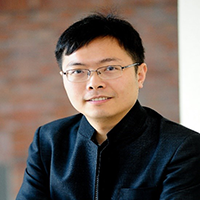
Sen Song Ph.D.
Principal investigator, Department of Biomedical Engineering, Tsinghua University Assistant Director of Brain and Intelligence Laboratory of Tsinghua University
Since my childhood, I have been fascinated by two questions:1) why human can do intelligent things that computers cannot do, and 2) what is a good life. I am glad to find out that I can tackle these fundamental questions with the tools provided by modern neuroscience, particularly because the interdisciplinary nature of brain research provides many exciting avenues to pursue their answers. Since coming to Tsinghua, I have also been increasingly interested in brain related medical problems, like depression and anxiety disorders. The overarching theme in my lab is what I call connectomics and functional connectomics: we take inspirations from genomics and functional genomics to arrive at a circuit diagram of the brain. Our work uncovers the relations between circuit structures and functions to elucidate the computational processes carried out by those circuits. Current research includes:
1. Combining the knowledge of brain science, cognitive science and artificial intelligence to construct a whole brain functional computational model.
2. Using imaging, optogenetics, and EEG to study the neural basis of advanced cognitive functions such as positive emotions and motivation, aesthetics, semantic understanding, thinking and reasoning.
3 Using quantitative methods, artificial intelligence algorithms, and brain feedback techniques for diagnoses and treatment of emotional disorders, as well as to improve the quality of life and well-being of normal people.
4. Using artificial intelligence algorithms such as deep learning, especially graph neural network technology, to develop new computing tools to analyze the large amount of data generated by connectomics, genomics, and brain imaging technologies.
Degrees
Brandeis University, Ph.D., 2002
University of Mississippi, B.A., 1996
Appointments
Tsinghua University Medical School, Principal Investigator, 2010 - current
Massachusetts Institute of Technology, Postdoctoral Fellow, 2004 - 2010
Cold Spring Harbor Laboratory, Postdoctoral Fellow, 2002 – 2004
GPC Biotech, Computational Biologist, 2001 – 2002
Selected Publications
Pei, J.#, Deng, L.#, Song, S.#, Zhao, M.#, Zhang, Y.#, Wu, S.#, Wang, G.#,…&Shi, L. *(2019).Towards artificial general intelligence with hybrid Tianjic chip architecture. Nature, 572, 106–111.
Liao, F., Liang, M., Li, Z., Hu, X.*, & Song, S.* (2019). Evaluate the Malignancy of Pulmonary Nodules Using the 3-D Deep Leaky Noisy-or Network. IEEE transactions on neural networks and learning systems.
Chen, C., Cheng, M., Ito, T.*, & Song, S.* (2018). Neuronal organization in the inferior colliculus revisited with cell-type-dependent monosynaptic tracing. Journal of Neuroscience, 38(13), 3318-3332.
Liu, X., Mou, L., Cui, H., Lu, Z.*, & Song, S.* (2018). Jumper: Learning when to make classification decisions in reading. arXiv preprint arXiv:1807.02314. IJCAI 2018
Liao, F., Chen, X., Hu, X. *, & Song, S.* (2017). Estimation of the volume of the left ventricle from MRI images using deep neural networks. IEEE transactions on cybernetics, 49(2), 495-504.
Zhu, C.#, Yao, Y.#, Xiong, Y., Cheng, M., Chen, J., Zhao, R., ... & Song, S.* (2017). Somatostatin neurons in the basal forebrain promote high-calorie food intake. Cell reports, 20(1), 112-123.
Zhao, Z., Wang, L., Gao, W., Hu, F., Zhang, J., Ren, Y., Lin, R. Feng, Q., Cheng, M., Ju, D., Chi, Q., Wang, D., Song, S., Luo, M., Zhan, C.* (2017). A central catecholaminergic circuit controls blood glucose levels during stress. Neuron, 95(1), 138-152.
Li, X., Steffens, D. C., Potter, G. G., Guo, H., Song, S., & Wang, L.* (2017). Decreased between‐hemisphere connectivity strength and network efficiency in geriatric depression. Human brain mapping, 38(1), 53-67.
